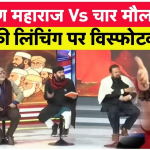
Facing the Fanatics: Gauri Lankesh remembered Teesta Setalvad, Arundhati Roy and Kavita Lankesh discuss the slain journalist’s legacy
29, Jan 2021 | CJP Team
On the eve of Gauri Lankesh’s 59th birth anniversary, filmmaker Kavita Lankesh, who is also Gauri’s sister unveiled a booklet of her poems about her formidable sister. The booklet titled Akka is a compilation of Kavita Lankesh’s poems in Gauri’s memory and was compiled and produced by CJP.
“I keep wondering what would she have said, during all these three years, about CAA, the plight of people in Assam and now the Farmers’ agitation,” said Kavita referring to the various people’s movements that have come up in the period after Gauri Lankesh’s assassination.
Gauri Lankesh was gunned down on September 5, 2017 outside her home in Bengaluru, allegedly by members of a right-wing supremacist group. While multiple arrests have been made, and chargesheets have been filed, the trial has not commenced yet.
Gauri Lankesh holds a very special place in our hearts. CJP’s commitment to human rights–based journalism is our tribute to one of India’s bravest women. To support CJP’s quest to deliver hard-hitting stories about people’s struggles and resilience in face of oppression and divisive politics, Donate Now.
At the online commemoration, CJP secretary and human rights defender Teesta Setalvad read out the poem titled The Last 10 Seconds, her voice cracking towards the end. Setalvad and Gauri Lankesh were close friends. In her introduction to the booklet, Setalvad had referred to Gauri Lankesh as “a fearless tigress-kitten” and that this (booklet) “is from your loving sister”, showcasing the close bond the two journalist-activists shared.
CJP and Gauri Memorial Trust also held a commemorative discussion where writer-activist Arundhati Roy and Teesta Setalvad came together to discuss the growing fascism and intolerance for dissent in the country. Arundhati Roy took the opportunity to point out, “We have to look at the farmers and learn from them how to reclaim a very wide space,” referring to the diversity and intersectionality within the farmers’ movement itself.
Setalvad also recalled how this intersectionality was always reflected in Gauri Lankesh’s work which is why after her death, Adivasi bonded labourers wept in sorrow as Lankesh’s journalism had helped highlight their plight, when the mainstream media by-and-large ignored them.
Roy also cautioned against a “pattern” of how violence breaks out. She said, “The pattern is so similar, isn’t it? What happened then… sort of spinning it into a pogrom, the politicians so openly doing that… calling for violence, literally and you could see the police supporting that. And what happened during Republic Day, once again you could see a person very close to this ruling establishment to try and slide the ground from under the feet of this spectacular and very peaceful protest.” Roy was referring to BJP leader Kapil Mishra’s speech at Jafrabad last year, which is being seen as the trigger for the outbreak of violence in Delhi in February 2020. Meanwhile, Punjabi actor Deep Sidhu who is accused of triggering what transpired at the Red Fort on Republic Day, is believed to be close to members of the ruling regime. Roy added, “I think the farmers are showing a great deal of wisdom and political spine.”
Roy also spoke about how the “opening of two locks” led to the spread of “economic fundamentalism” and “right-wing fundamentalism” and how then both of these things produced their own “cycles of violence”. She said, “Both things led to this country increasingly becoming a police state, increasingly passing laws that couldn’t possibly be called democratic.”
Setalvad then brought up the arrests of Umar Khalid, Stan Swamy and Varavara Rao in connection with the Bhima Koregaon violence of January 1, 2018, as well as the abrogation of Article 370. “There is a list of dark laws now. There’s the Citizenship Amendment Act, there’s the UAPA amendment, there are the three farmers’ laws, the labour codes which have overturned 48 pieces of labour legislation!”
Setalvad also brought up how the UP Ordinance about damage to property was being used to penalise helpless rickshaw-pullers whose holding are being seized. “There are the love-jihad laws. It’s literally a government declaring a war on its people through a process of majoritarian democracy,” said Setalvad.
Setalvad also brought up the plight of people facing statelessness in Assam, as well as the helplessness of crores of migrant workers who had hitherto been completely ignored by policy makers and whose plight only came to light after the sudden Covid-19 lockdown last year.
The entire discussion may be viewed here:
Related:
Frail yet fearless: Remembering Gauri Lankesh
‘Meticulous’ investigation yet little headway in Gauri Lankesh murder case
Gauri Lankesh laid to rest, but The Truth could not be buried
Gauri Lankesh Murder Case: Chargesheet names Sanatan Sanstha









